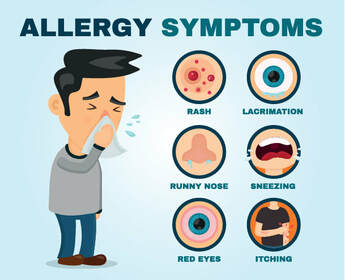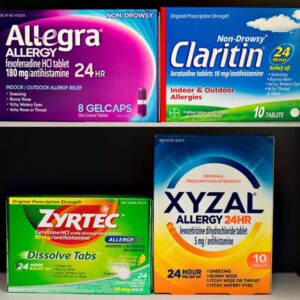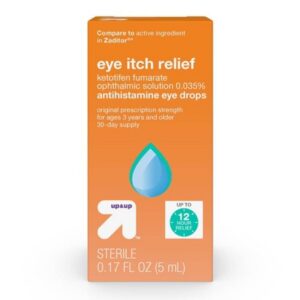Posts Tagged ‘Allergies’
Navigating Allergy Season. By Our Student Pharmacist, Madison Price.
What are allergies and why do people have allergies?
Constantly sneezing, nasal congestion, and a runny nose are commonly experienced allergy symptoms.
Did you know that allergies are our bodies overreaction to something that would normally not cause a response?
Our immune system responds to allergy triggers by releasing a chemical known as histamine. Histamine is what causes symptoms such as sneezing, a runny nose, nasal congestion, itchy, dry eyes, or postnasal drip. Allergens cause our bodies to release histamines and produce allergies.
For some individuals, allergies may be present year-round or occur during certain seasons. If you have year-round allergy symptoms, you could be allergic to pet dander, mold, or dust mites inside and outside the home. An example of seasonal allergens includes pollen or ragweed, that are prominent in the spring and fall.
What are the treatment options for allergies?
There are two methods to prevent and treat allergy symptoms: avoid the allergen or lower the body’s response to the allergen.
In the home, using a dehumidifier will work to keep the nasal passages moist and adding High Efficiency Particle Air (HEPA) filters will filter pollen, mold, bacteria and other circulating airborne particles.
When outside during high pollen counts, avoid touching your eyes to prevent additional irritation. Upon returning inside, change clothing or bathe to remove any pollen from the skin and hair.
For some allergy sufferers, it can be difficult to avoid the allergen altogether. Luckily, there are a variety of over-the-counter products for seasonal and year-round allergies.
Searching the allergy aisle can feel overwhelming. There are so many options. Which one should you purchase? Allergy medications come in a variety of formulations including intranasal sprays, oral antihistamines, oral decongestants, and eye drops.
Intranasal Corticosteroids
- Examples
- Flonase (fluticasone propionate) – ages 4 and up
- Flonase Sensimist (fluticasone furoate) – ages 2 and up
- Nasacort (triamcinolone) – ages 2 and up
- Rhinocort (budesonide) – ages 6 and up
- What symptoms do these medications help?
- Congestion, runny nose, sneezing, itchy, watery eyes
- When/how to use:
- Moderate to severe year-round allergies or start using prior to the beginning of seasonal allergies. Intranasal corticosteroids need to be in your system before allergen exposure to provide relief. These are not ideal for allergic episodes.
Oral Antihistamines
- Examples
- 1st generation – chlorpheniramine, diphenhydramine (Benadryl), doxylamine, meclizine
- Side effects- drowsiness, dry mouth
- 2nd generation – cetirizine (Zyrtec), loratadine (Claritin), fexofenadine (Allegra), levocetirizine (Xyzal)
- Side effects – some drowsiness with cetirizine, but overall well tolerated.
- What symptoms do these medications help?
- Oral histamines treat the same symptoms as intranasal corticosteroids but to a lesser extent.
- When/how to use:
- Mild symptoms with allergy episodes or seasonal allergies
- 1st generation – chlorpheniramine, diphenhydramine (Benadryl), doxylamine, meclizine
Oral decongestants
- Examples
- Sudafed
- Sudafed PE
- What symptoms do these medications help?
- Congestion and sinus pressure
- When/how to use
- Best used when your allergies are bad and congestion remains despite trying other medications. Sudafed and other combination products are kept behind the counter at the pharmacy and require an ID to purchase. Additionally, they can cause increases in blood pressure and heart rate, so individuals with these conditions should use caution when taking them.
Miscellaneous Allergy Medications
Ocular antihistamines
- Example
- Ketotifen (Zatidor)
- What symptoms are helped?
- If your allergy symptoms are mainly red, itchy, watery eyes
Nasal decongestants
- Example
- Oxymetazoline (Afrin)
- What symptoms are helped?
- Nasal congestion
- When/how to use
- These can be great for nasal congestion, but it’s important to know they can only be used for three days before taking at least a five day break before restarting. If used longer than three consecutive days, these products can cause “rebound congestion” which may be harder to treat than the original congestion you experienced.
As you can see, there are many over-the-counter options to treat allergies. The best option for you depends on your symptoms, how long you’ve been experiencing symptoms, and your past medical history. It’s also very important to stay consistent once you’ve selected a medication in order to see results.
Feel free to stop by Happy Druggist or give us a call with any questions you may have about allergy medications!
References:
https://www.aafa.org/media/3278/aafa-2022-allergy-capitals-report.pdf
https://www.cdc.gov/climateandhealth/effects/pollen-health.htm
https://www.cdc.gov/climateandhealth/effects/allergen.htm
https://www.aafa.org/allergies.aspx
Allergy Relief? Sinus up! By Our Student Pharmacist, Cat Mechler.
What are allergies?
Allergies are a result of your body overreacting to foreign objects, that we call allergens. Seasonal allergies are fairly common as there are many allergens that can trigger an allergic reaction, including(1):
- Pet dander
- Dust mites
- Grass
- Weeds
- Trees
- Mold
Symptoms of seasonal allergies are similar to those of a cold and include(1):
- Itchy/watery eyes
- Congestion
- Runny/itchy nose
- Sneezing
- Skin rash
When can I get allergy symptoms?
Typically, allergies can begin as early as the end of February and last until the end of the summer. However, you may experience these symptoms at any time during the year, depending on where you are in the country. The specific allergen that’s triggering your allergies can also affect when you get them.(2)
What can I do to treat them?
The best thing you can do to prevent these symptoms is to avoid the allergen. Monitoring pollen counts, keeping windows and doors shut, and taking a shower after you’ve been outside during allergy season are a few ways to help minimize your risk of experiencing allergy symptoms.(2)
It’s not always possible to completely avoid triggers. There are a variety of options that can be found over the counter (OTC) to help control your allergies. At first, the amount of OTC allergy products can seem overwhelming; however, there are generally 5 different types of products to choose from:
- Glucocorticoid nasal sprays are the most effect single treatment to help relieve(3):
- Congestion
- Runny/itchy nose
- Sneezing
These nasal sprays may cause local irritation, including drying or burning of the nose or throat. Another important thing to know is that these medications can take several days to weeks of daily use to see the full effects.
Examples include:
- budesonide (Rhinocort)
- fluticasone propionate (Flonase)
- triamcinolone (Nasacort)
Be careful not to pick out a nasal decongestant spray, like phenylephrine or oxymetazoline. These are not recommended for the routine treatment of seasonal allergies.
- Nasal Saline – Saline spray or irrigation can be beneficial for milder symptoms and offers some relief for:
- Runny nose
- Itchy throat
- Congestion
It’s important to remember if using the nasal saline irrigation to always use distilled, sterilized, or boiled water that has cooled to room temperature to kill any potentially infectious organisms.(4)
- Oral antihistamines – Good option if you’re looking for something to help control mild to moderate symptoms, especially:
- Itching
- Sneezing
- Runny nose
These medications are less effective for congestion in comparison to the glucocorticoid nasal sprays.(5) Additionally, antihistamines often cause sleepiness. First generation antihistamines, including diphenhydramine (Benadryl), are more sedating than others. Typically, second generation oral antihistamines are less sedating and are therefore preferred to help treat allergy symptoms.
Less sedating second generation antihistamines include:
- cetirizine (Zyrtec)
- levocetirizine (Xyzal)
- loratadine (Claritin)
- fexofenadine (Allegra)
Some other side effects of these medications could include dry eyes and mouth.
- Antihistamine eye drops – Option that offers relief for itchy or red eyes
Refrigeration or using refrigerated artificial tears prior to the antihistamine eye drops may help to reduce burning/stinging sensation upon installation. Other side effects could include increased eye dryness or headache. (6)
Examples include:
- ketotifen (Alaway or Zaditor)
- olopatadine (Pataday)
- Artificial tears are another option to help with dry eyes that would in turn reduce redness.
Of course, if you’re having trouble picking the product that will work best for you, feel free to ask the pharmacist!
Sometimes OTCs aren’t enough to control your allergies and you might have to go to a doctor who specializes in allergy control. They might suggest immunotherapy or allergy shots. These are very effective in treating your persistent allergy symptoms and may even make you “less allergic” over time.(2)
References:
- https://www.healthline.com/health/allergies#treatments
- https://acaai.org/allergies/seasonal-allergies
- Dykewicz MS, Wallace DV, Baroody F, et al. Treatment of seasonal allergic rhinitis: An evidence-based focused 2017 guideline update. Ann Allergy Asthma Immunol. 2017;119(6):489-511.
- https://www-fda-gov.proxy.lib.ohio-state.edu/consumers/consumer-updates/rinsing-your-sinuses-neti-pots-safe
- Kaszuba SM, Baroody FM, deTineo M, Haney L, Blair C, Naclerio RM. Superiority of an intranasal corticosteroid compared with an oral antihistamine in the as-needed treatment of seasonal allergic rhinitis. Arch Intern Med. 2001;161(21):2581-2587.
- Allergic conjunctivitis: Management. UpToDate. Wolters Kluwer. Hudson, OH. Available at: https://uptodate.com. Accessed August 18, 2020.
- https://santafeent.com/sinus-allergy/allergies-overview/allergic-rhinitus/
Allergies. By Our September Student Pharmacist, Rebecca Miller.
There are many kinds of allergies (food, pollen, pet, mold, dust, insect sting/bite, latex, drug, the list goes on…) but today’s discussion will focus on seasonal allergies caused primarily by pollen.
What are allergies?
Allergies are what happen when your body sees something normal from your environment and thinks that it is an invader. Imagine what happens when you see a garden hose slinking through tall grass… You scream ‘SNAKE’ and start to hit it with a shovel and end up with lots of missing chunks of your yard… Maybe that is just me after three cups of coffee. But that is what is happening inside your body when you have allergies–your immune cells see something that vaguely looks like something bad and then they attack. But during the attack, they also cause collateral damage and that damage is the symptoms of seasonal allergies
What are the symptoms of seasonal allergies?
The most common symptoms of seasonal allergies affect the nose and eye, can be mild or severe, and are often confused with a cold:
- Runny or stuffy nose
- Sneezing
- Itchy nose, eyes, or ears
- Puffy or watery eyes
- Cough
- Fatigue
Can seasonal allergies happen all year?
A person can have environmental allergies that affect them all year, though they usually have different causes. Seasonal allergies are most commonly caused by pollen, while year-round allergies (at least in Ohio) are more likely to be caused by pets, dust, or mold. A person could also suffer from both seasonal and year-round allergies.
How do you treat seasonal allergies?
Over-the-counter antihistamines are usually very effective at treating seasonal and year-round allergies. There are also nasal sprays and eye drops available. Talking with your pharmacist can help you decide which option is best for you.
How do you prevent seasonal allergies?
The best way to prevent seasonal allergies is to figure out what you are allergic to and then avoid it. This is much easier for some people than others. The person who is allergic to grass pollen will find it much harder, for instance, to avoid the cause of their allergy than someone who is allergic to marigold pollen. Even so, there are some things that everyone can do:
- Use air filters in your house which meet HEPA standards and change those filters regularly to reduce the amount of allergens in the air in your house.
- Stay indoors on windy days when allergens are more likely to be picked up into the air by the wind.
- Don’t hang laundry outside because allergens can stick to them and then to you.
- Avoid doing yardwork, but if you must be outside, make sure to shower and change your clothes as soon as you are done to remove any allergens that might be on you or your clothing.
When should you talk to the doctor?
Seasonal allergies are often easy to take care of on your own, but there are some instances where it is important get the doctor involved. If you are experiencing any of the following, then you should talk with your doctor:
- If your symptoms are affecting your ability to complete normal daily activities
- If over-the-counter medicines are not able to control your symptoms
- If you suffer from asthma or another chronic respiratory illness
- If you have significant pressure/pain in your sinuses or ears












